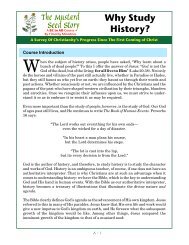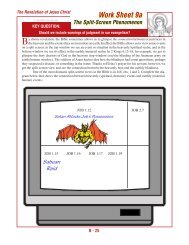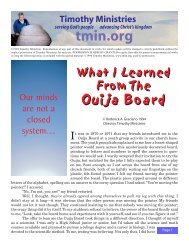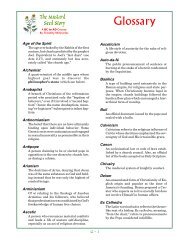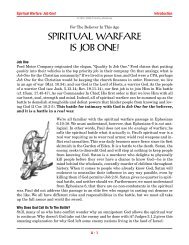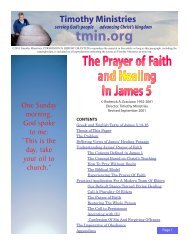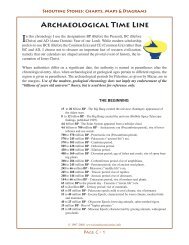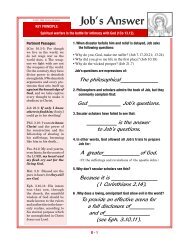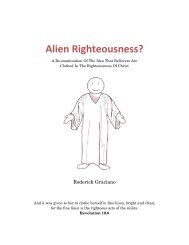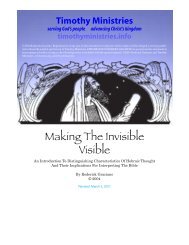Making The Invisible Visible Section 4
Making The Invisible Visible Section 4
Making The Invisible Visible Section 4
You also want an ePaper? Increase the reach of your titles
YUMPU automatically turns print PDFs into web optimized ePapers that Google loves.
Hermeneutics: <strong>Making</strong> <strong>The</strong> <strong>Invisible</strong> <strong>Visible</strong> — © 2004 Roderick Graciano<br />
sacrifices typifying that atonement through the ages, and rightly so. However, the<br />
Genesis 15 event describes a covenant rather than an atonement, and we westerners<br />
have neither understood that covenant precedes atonement nor why it does. Research<br />
into the cultures and customs of the middle east reveal that any ritual of sharing,<br />
participating in or passing through the same blood (as in walking through a door with<br />
bloodied doorposts), was a symbolic act of creating kinship, i.e., of becoming family, just<br />
as in the “blood brother” rituals of Native Americans. 12 <strong>The</strong> Bible itself reveals that in<br />
God’s economy of justice, only a kinsman can properly redeem the property or life of<br />
another person. In fact, the Hebrew noun kinsman (goel) provides the verb gaál which<br />
is translated in our Bible as both to redeem and to avenge, for its essential meaning<br />
is to act as a kinsman. When we grasp this vital importance that is given to relationship<br />
and kinship in Hebraic thought, the passing of God through the blood in Genesis<br />
15 — that blood that Abram had been walking back and forth in already — becomes<br />
immensely significant: God was signifying to Abram that He, the Almighty, was committing<br />
Himself as a kinsman to Abram, and therefore making himself both eligible<br />
and obligated to serve as Redeemer for Abram and his offspring.<br />
It is on this early foundation of relational ideas that the more developed doctrines<br />
of sacrificial and substitutional atonement are based, as are the eschatological<br />
hopes of salvation, inheritance and rule.<br />
This same priority upon relationship informs the Hebraic idea of righteousness<br />
and perfection. When God reckoned Abram’s faith to him as righteousness<br />
(Gen. 15.6), it does not mean that God pretended that Abram was righteous, but<br />
rather that God saw Abram as really and truly righteous, for righteousness is relational<br />
rather than based upon religious attainment. Abram still had his flaws<br />
from a religious-attainment perspective — he had neither attained sinlessness nor<br />
even spiritual maturity. Nevertheless, he had entered into right relationship with God<br />
and was thereby righteous. Likewise, Job was a perfect man (Job 1.1, KJV), not because<br />
he had attained to sinlessness or to a level of character or religious performance that<br />
needed no improvement, but rather because he was in perfect relationship to God,<br />
relative to the revelation of God that he had received thus far.<br />
<strong>The</strong> Land<br />
Just as God taught His people to value relationship, He taught them to value the<br />
land. God places a value on the earth in general, as the place of man’s habitation and<br />
redemption, and on the land of Israel in particular as the place of His special presence.<br />
<strong>The</strong> Hebrew in turn, valued the land as the region of God’s redemptive work (Psa.<br />
75.12) and the sphere of his own future hope (Psa. 37.29,34; Isa. 57.13; 60.21; Ezek.<br />
47.13,14). “<strong>The</strong> word earth (Hebrew eretz) is used in the Old Testament five times more<br />
frequently than heaven (Hebrew shamayim). 13<br />
A proper understanding of the Hebraic perspective of the land will guard us from<br />
confusion, particularly in the study of biblical eschatology. In the Hebrew mind, the<br />
messianic hope was never divorced from a redemption of the land. Any interpretation<br />
of the coming eschatological kingdom without reference to people on the land is missing<br />
part of the story or allegorizing passages that should be taken literally.<br />
Furthermore, we must not lose sight of the particular priority placed upon the<br />
land of Israel, and the city of Jerusalem. When the Hebrew scriptures speak of the earth,<br />
ha aretz, they rarely mean “the globe.” Equating “earth” with the “globe” is something<br />
Page 11



